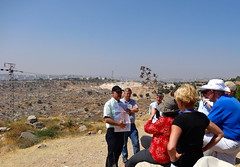- Facebook118
- Total 118
Yesterday in Jerusalem, the president told the story of Israel, much as mainstream Israelis understand it, and then asked his audience to see the Palestinians’ side of the story. Those passages in his speech drew applause. I used to think that the ability to see the other side was an unambiguous moral gain that would increase the chance of peace–because, as Obama said yesterday, “peace begins, not just in the plans of leaders, but in the hearts of people; not just in some carefully designed process, but in the daily connections, that sense of empathy that takes place among those who live together.”
But this is what I experienced last summer in Israel and the West Bank that complicated that assumption for me. Senior members of the Israeli establishment–diplomats, politicians, and officers in the IDF (up to Lieutenant General rank)–are all excellent at explaining “the Palestinian narrative.” They are quick to tell you that Israelis and Palestinians are two wounded peoples, with the Holocaust on one side and Al-Nakba (the Palestinian Catastrophe of 1948) on the other. They express views much like Obama’s on Thursday:
It is not fair that a Palestinian child cannot grow up in a state of their own — (cheers, applause) — living their entire lives with the presence of a foreign army that controls the movements, not just of those young people but their parents, their grandparents, every single day.
They will say this kind of thing in plain sight of the security fence (a.k.a. West Bank barrier) that they have built to separate themselves from Palestinian neighborhoods–choosing where it lies and who can cross it, and governing both sides.
I am convinced that they do not merely repeat but actually believe in their hearts the kinds of sentiments to which the President called them in this part of his speech:
But I — I’m going off script here for a second, but before I — before I came here, I — I met with a — a group of young Palestinians from the age of 15 to 22. And talking to them, they weren’t that different from my daughters. They weren’t that different from your daughters or sons.
I honestly believe that if — if any Israeli parent sat down with those kids, they’d say, I want these kids to succeed. (Applause.) I want them to prosper. I want them to have opportunities just like my kids do. (Applause.) I believe that’s what Israeli parents would want for these kids if they had a chance to listen to them and talk to them. (Cheers, applause.) I believe that. (Cheers, applause.)
They cheered Obama in Jerusalem, and last summer I observed a moving encounter between an Israeli intelligence officer and a Palestinian businesswoman–mother to mother, wishing each other the best. I think this kind of recognition has grown over time. Mrs. Netanyahu summarized the old popular view when she claimed, “When the Jews came to this area, there were no Arabs here. They came to find work when we built cities. There was nothing here before that.” That is not PC any more; now the kinds of people I talked to know all about the Palestinians under Turkish and British rule and what they lost in ’48.
But … that doesn’t lead to action. You can be sincerely empathetic but not willing to do anything to remedy a situation in which you are complicit. Americans are like that every day. To name a timely example, we were involved in killing between 150,000 and 1 million Iraqis over the past ten years, and not many of us did anything to stop that. Detroit now encompasses a contiguous abandoned urban area larger than Manhattan, and not many Americans lift a finger. I am not equating Iraq, the West Bank, and Detroit–merely noting that empathy doesn’t often cause action.
But I worry about something worse. Being able to express empathy, even if it is perfectly sincere, makes one feel better and also wins the trust of third parties. I was disarmed hearing Israeli leaders tell me the “Palestinian narrative.” When an Israeli settler leader failed to acknowledge the Palestinian perspective, he lost me completely. When the Fatah representatives whom we met in Ramallah refused to acknowledge that Israelis believe they have a historic link to the land, I marked them down a notch in my own mental estimation, thinking they were narrow-minded.
This means that empathy not only fails to produce justice; it can be an asset in an unjust conflict. In the Israeli case, empathy is the kind of asset that comes from being fairly secure day to day and from having a wealthy, highly educated, cosmopolitan population. Israelis recently voted on the basis of the kinds of consumer-oriented, domestic issues that usually move US voters; peace was a side issue, just as it was in the US in 2o12. The Tel Aviv real estate market is booming. Its citizens can afford to hope that Palestinian kids succeed. But will they let them?
